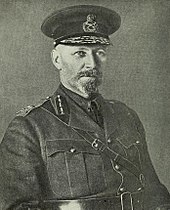Jan Christiaan Smuts
Jan Christiaan Smuts (born May 24, 1870 on the Bovenplaats farm near Riebeek West , Cape Colony ; † September 11, 1950 in Irene near Pretoria ; occasionally Jan Christian Smuts ) was a South African statesman , philosopher , Boer general and British field marshal . From 1919 to 1924 and from 1939 to 1948 he was Prime Minister of the Union of South Africa .
Life
Smuts was a supporter of Cecil Rhodes until it was revealed that Rhodes had instigated the disastrous Jameson raid .
He then moved from Cape Town to Johannesburg , where he practiced as a lawyer and eventually became a prosecutor . He later became a minister in the government of the Boer Republic of the Transvaal , which was led by Paul Kruger until the outbreak of the Second Boer War . During the Boer War, he led a command for the Boers in the Cape Colony, where he was very successful in guerrilla warfare . After the end of the war in 1902 he was a member of the South African Party , which in 1934 became the United National South African Party . He returned to politics as a member of the South African government under Louis Botha and was instrumental in the peace negotiations and the Peace of Vereeniging . At the time when Mahatma Gandhi was in the Transvaal and Natal and campaigned for the interests of the Indian minority , Smuts was his fiercest opponent. In 1908, however, they concluded the “Gandhi-Smuts Compromise”, which converted the Indians' obligation to register into an optional rule. After Gandhi's return to India, they both had long correspondence.
After the outbreak of the First World War , he returned to the army and fought against the German troops in German East Africa . In 1917 David Lloyd George called him to the British War Cabinet in London . After signing the Treaty of Versailles in 1919, Smuts returned to South Africa, where he was Prime Minister of the Union of South Africa from 1919 to 1924 and in 1939 until the 1948 elections .
Smuts is responsible for several laws aimed at increasing the segregation of the population groups in South Africa. In 1913 he introduced a law ( Natives Land Act ) into parliament, which provided for the black reservations and forbade them to acquire land outside these areas. In 1923 he also arranged that blacks lost their homes in the cities and that they were relocated to separate townships on the outskirts.
During World War II he worked closely with British Prime Minister Winston Churchill . In 1941, Smuts was appointed Field Marshal by Churchill. Smuts was the only politician who signed peace treaties at the end of both world wars (treaties of the Paris Peace Conference of 1919 and 1946 ). He was involved in founding both the League of Nations and the UN . In 1948 he lost in the parliamentary elections despite the higher number of votes against the Nasionale Party (NP) under Daniel François Malan . Since 1943 he was an honorary member of the American Academy of Arts and Letters and the Royal Society of Edinburgh .
Jan Smuts was Chancellor of the Universities of Cape Town (1936 to 1950) and Cambridge (1948 to 1950). He died on September 11, 1950 on his farm in Irene near Pretoria. In addition to his political activities, Smuts dealt with natural philosophy and the history of biology . He is considered to be the originator of the term holism as the philosophical trend which, in contrast to mechanistic and vitalistic theories, takes the view that in biology the whole is more than the union of its parts.
Jan Smuts married Isabella (Issie) Margaretha Krige in 1897, later known as "Ouma" ("Grandma"). She came from Stellenbosch , where her father owned a dormitory. Smuts and his wife had six children.
reception
Johannesburg Airport was named after Smuts until 1994. The second highest mountain on Marion Island was called Jan Smuts Peak , but has also been renamed since then. A statue of Smuts stands in front of the British Parliament in London; the ensemble in Parliament Square has since been supplemented by statues of the anti-colonial politicians Nelson Mandela and Mahatma Gandhi.
Works
- Holism and Evolution. Macmillan, London 1926 (German: Die holistische Welt. With a foreword by the author to the German edition and a foreword by Adolf Meyer, edited and translated by Helmut Minkowski. Metzner, Berlin 1938).
Web links
- Literature by and about Jan Christiaan Smuts in the catalog of the German National Library
- Newspaper article about Jan Christiaan Smuts in the press kit of the 20th century of the ZBW - Leibniz Information Center for Economics .
- Smuts' understanding of holism: Keyword "Holism" (Lexicon of Gestalt Therapy)
Individual evidence
- ^ The Library, University of the Witwatersrand: Jan Christiaan Smuts Papers . on www.historicalpapers.wits.ac.za (English)
- ↑ Smuts at sahistory.org.za , accessed on March 11, 2016
- ^ Honorary Members: Jan Christian Smuts. American Academy of Arts and Letters, accessed March 23, 2019 .
- ^ Fellows Directory. Biographical Index: Former RSE Fellows 1783–2002. (PDF file) Royal Society of Edinburgh, accessed April 9, 2020 .
- ↑ Elwyn Jenkins: Falling into Place. The Story of Modern South African Place Names. New Africa Books, Claremont 2007, ISBN 0-86486-689-5 , p. 47. ( Limited preview in Google Book Search ).
| personal data | |
|---|---|
| SURNAME | Smuts, Jan Christiaan |
| ALTERNATIVE NAMES | Smuts, Jan Christian (alternative spelling) |
| BRIEF DESCRIPTION | South African statesman and general |
| DATE OF BIRTH | May 24, 1870 |
| PLACE OF BIRTH | Bovenplaats near Riebeek West , Cape Colony |
| DATE OF DEATH | September 11, 1950 |
| Place of death | Irene at Pretoria |


